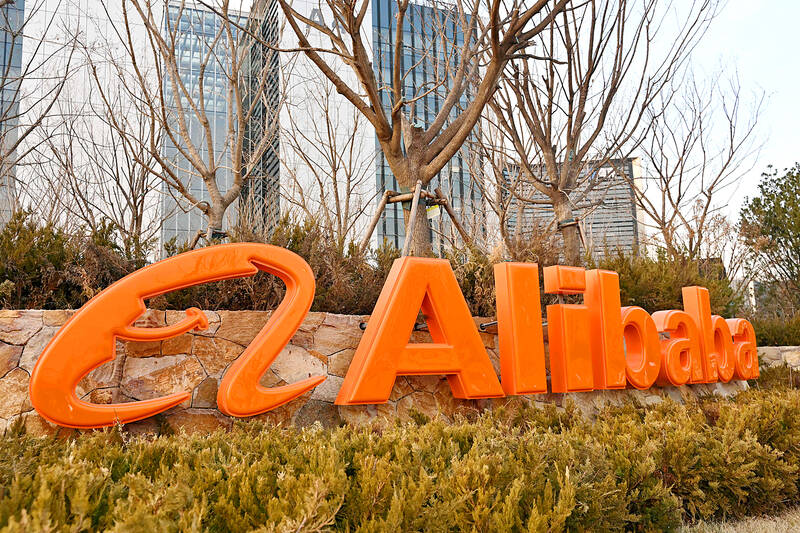Chinese technology and e-commerce giant Alibaba Group Holding Ltd (阿里巴巴) yesterday reported robust sales growth in its latest quarter, beating analyst expectations as Beijing looks to revive faith in the private sector.
The Hangzhou-based firm operates some of China’s most widely used online shopping platforms, making its performance a bellwether for consumer sentiment.
The company is enjoying a comeback with its share price soaring so far this year and legendary co-founder Jack Ma (馬雲) being pictured with Chinese President Xi Jinping (習近平) after spending several years out of the public eye.

Photo: Adek Berry, AFP
The charismatic billionaire once spoke boldly about the shortcomings of China’s financial and regulatory systems but has held his tongue in recent years following Xi’s sweeping crackdown on the tech sector and the scuttling of Alibaba affiliate Ant Group Co’s (螞蟻集團) initial public offering.
Alibaba said yesterday that revenue rose eight percent to 280 billion yuan (US$38.4 billion) in the three months through December, exceeding the 277 billion yuan estimated by a Bloomberg pool of analysts.
The firm’s fastest pace of revenue growth in more than a year reflects a turnaround in its commerce business and big strides into the critical field of artificial intelligence (AI)
The cloud division, which houses the company’s diverse AI-related projects and hosts computing power for external clients, grew revenue 13 percent to US$4.3 billion. International commerce sales — driven by overseas marketplaces such as AliExpress (全球速賣通) and Trendyol — surged 32 percent in the December quarter, the company said.
Net income attributable to ordinary shareholders jumped to nearly 49 billion yuan, a rise of 239 percent, it said.
"This quarter’s results demonstrated substantial progress in our ’user first, AI-driven’ strategies and the re-accelerated growth of our core businesses," Alibaba CEO Eddie Wu (吳泳銘) said.
"We will continue to execute against our strategic priorities in e-commerce and cloud computing, including further investment to drive long-term growth," he added.
Alibaba has benefitted from a strong rally among Chinese technology stocks and has seen its shares soar over 40 percent so far this year.
The strong upturn has owed much to investor optimism over Chinese breakthroughs in AI, with insurgent firm DeepSeek (深度求索) causing a global stir last month with an AI chatbot that seemingly matches US peers at a fraction of the cost.
Alibaba is one of many Chinese technology firms racing to get ahead in the AI space. Last month, it unveiled its latest Qwen (通義千問) AI model that has performed well in benchmark tests.
Alibaba is working with Apple Inc to incorporate its AI technology into Chinese iPhones, the firm said earlier this month.

South Korea’s equity benchmark yesterday crossed a new milestone just a month after surpassing the once-unthinkable 5,000 mark as surging global memory demand powers the country’s biggest chipmakers. The KOSPI advanced as much as 2.6 percent to a record 6,123, with Samsung Electronics Co and SK Hynix Inc each gaining more than 2 percent. With the benchmark now up 45 percent this year, South Korea’s stock market capitalization has also moved past France’s, following last month’s overtaking of Germany’s. Long overlooked by foreign funds, despite being undervalued, South Korean stocks have now emerged as clear winners in the global market. The so-called “artificial intelligence

NEW IDENTITY: Known for its software, India has expanded into hardware, with its semiconductor industry growing from US$38bn in 2023 to US$45bn to US$50bn India on Saturday inaugurated its first semiconductor assembly and test facility, a milestone in the government’s push to reduce dependence on foreign chipmakers and stake a claim in a sector dominated by China. Indian Prime Minister Narendra Modi opened US firm Micron Technology Inc’s semiconductor assembly, test and packaging unit in his home state of Gujarat, hailing the “dawn of a new era” for India’s technology ambitions. “When young Indians look back in the future, they will see this decade as the turning point in our tech future,” Modi told the event, which was broadcast on his YouTube channel. The plant would convert

‘SEISMIC SHIFT’: The researcher forecast there would be about 1.1 billion mobile shipments this year, down from 1.26 billion the prior year and erasing years of gains The global smartphone market is expected to contract 12.9 percent this year due to the unprecedented memorychip shortage, marking “a crisis like no other,” researcher International Data Corp (IDC) said. The new forecast, a dramatic revision down from earlier estimates, gives the latest accounting of the ongoing memory crunch that is affecting every corner of the electronics industry. The demand for advanced memory to power artificial intelligence (AI) tasks has drained global supply until well into next year and jeopardizes the business model of many smartphone makers. IDC forecast about 1.1 billion mobile shipments this year, down from 1.26 billion the prior

People stand in a Pokemon store in Tokyo on Thursday. One of the world highest-grossing franchises is celebrated its 30th anniversary yesterday.